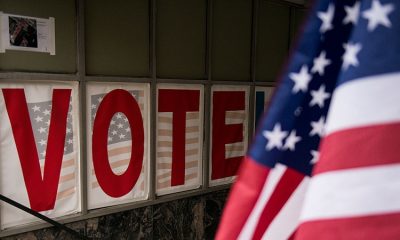Local News
Chinese land purchases raise questions about national security

Indianapolis, Indiana – On Monday, the bill’s sponsor described Chinese purchases of farms in Indiana as a national security concern.
The House passed a law prohibiting any foreign national or organization associated with a foreign enemy from purchasing any agricultural land in Indiana after July 1st, with unanimous approval at the beginning of February. After adding language that forbids the purchase of any land—other than residential leases—within 50 miles of a military base, like NSA Crane or Grissom Air Reserve Base, or within 10 miles of an armory or maintenance facility, a Senate panel overwhelmingly approved the bill on Monday morning.
The bill was filed, according to Rep. Kendell Culp, a Republican from Rensselaer, specifically in response to an uptick in Chinese land purchases. He stated that although equivalent legislation has not yet advanced, Congress is working on it.
“If we lose a fraction, even a fraction, of our food production, this quickly, would become a national security issue,” he said.
According to USDA data, as of December 2022, foreign investors owned more than 43 million acres in the US. Investors from NATO members Canada, the Netherlands, Italy, the United Kingdom, and Germany owned less than two thirds of that land. Though their ownership has come under scrutiny, Chinese investors possess somewhat less than 1% of all foreign-held land in the United States. This is especially true after a Chinese business attempted in vain to construct a wet grain milling plant 12 miles from Grand Forks Air Force Base in North Dakota.
The list of nations that are forbidden from purchasing land in Indiana by Culp’s law is not detailed. Rather, it refers to any nation that the U.S. Department of Commerce has designated as a foreign foe. At the moment, North Korea, Venezuela, China, Russia, Iran, and Cuba are on that list. Culp told News 8 that he purposefully took that action so that legislators wouldn’t have to make any adjustments if a country was added or removed from the list.
The only foreign power that presently possesses land in Indiana is China. Sixty-eight acres in Greene, Marion, and Noble counties are owned outright by three distinct people and businesses. Additionally, Sinochem Holdings Corporation, a Chinese enterprise, rents roughly 170 acres to the seed manufacturer Syngenta. Grandfathering in would apply to those holdings.
Brian Cavanaugh, a senior resilience adviser to the National Security Council in the Trump Administration, testified in-depth before the Senate Agriculture Committee. Purchases of land close to military bases, in particular, Cavanaugh said, could provide Chinese intelligence services permission to install surveillance gear. Sen. Jim Tomes, R-Wadesville, questioned Cavanaugh about the possibility that Chinese businesses might use another nation to purchase land. He said that the likelihood is that Chinese businesses will use nations that are presently on the list of foreign rivals. Any foreign entity purchasing land would have to sign an affidavit under the measure certifying they had no ties to any foreign adversaries. Any possible infractions would need to be looked at by the attorney general’s office.
Even while he supported the bill, Sen. Fady Qaddoura, a Democrat from Indianapolis, expressed concern that it might trap those who fled repressive governments and made a fresh start in Indiana. Sen. Jean Leising, a Republican from Oldenburg who sponsored the bill, said she would collaborate with Qaddoura to prepare a floor amendment making it clear that the bill would not apply to dual citizens. Culp stated he would back this modification.
Chris Daley, the executive director of ACLU of Indiana, likewise opposed the dual citizenship issue. He claimed that the bill’s provisions on military sites in particular would make it illegal for foreigners to own any kind of business, no matter how tiny, throughout a significant chunk of the state.
“You are telling them they are no longer welcome here except as employees of someone else. They cannot participate as owners of businesses if that includes owning or renting a storefront,” he said. “What about renewing a lease? What about when a lease changes? Are those folks going to be caught up?”
The entire Senate will now review the bill in further detail. Because of the Senate’s modifications, if it were adopted, it would need to be sent back to the House.
-

 Local News2 weeks ago
Local News2 weeks ago3 Indiana school districts asking voters for funding in May primary election
-

 Local News2 weeks ago
Local News2 weeks agoHendricks Co. Sheriff’s deputy dies after being electrocuted at crash scene
-

 Local News2 weeks ago
Local News2 weeks agoMyles Rice, a former Pac-12 Freshman of the Year, has committed to Indiana
-

 Local News2 weeks ago
Local News2 weeks agoIndiana limits abortion data for privacy under near-total ban; some GOP candidates push back
-

 Local News1 week ago
Local News1 week agoMan who won the primary election despite being accused of murder was found guilty of a lesser crime
-

 Local News2 weeks ago
Local News2 weeks agoRepresentative from Indiana invites people to attend the IBLC town hall series
-

 Local News1 week ago
Local News1 week agoA decrease in gun violence signifies South Bend’s accomplishment
-

 Local News1 week ago
Local News1 week agoWhile searchers continue to look for missing kayakers, experts warn of a deadly dam in the White River






Leave a Reply